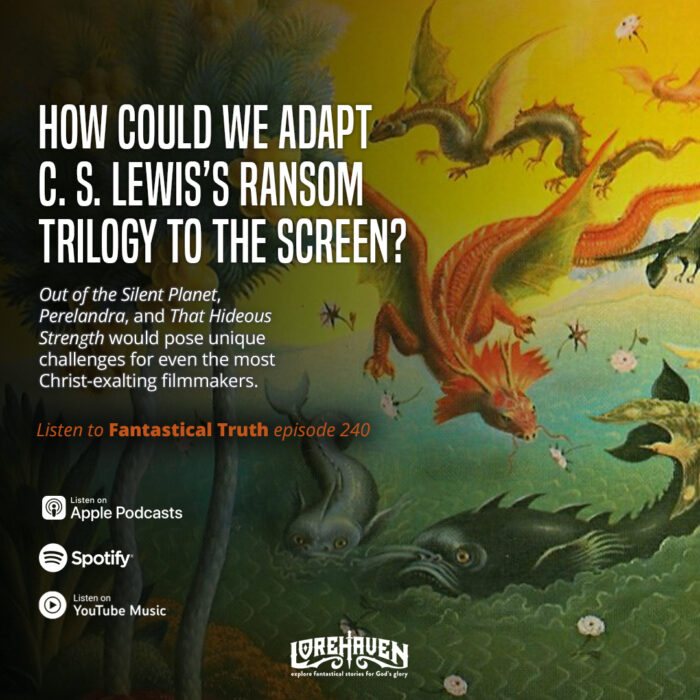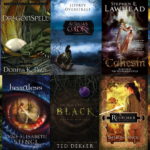C. S. Lewis: Don’t Chase Fandom Thrills For Their Own Sake
 Recently I’ve been re-listening to C. S. Lewis’s classic nonfiction work Mere Christianity.
Recently I’ve been re-listening to C. S. Lewis’s classic nonfiction work Mere Christianity.
This book1 is the source of many Lewis quotes we see spread about Christian devotionals, articles and internet “memes.”2
But I am rediscovering — as I do each time I re-read great books — other bits of wisdom that Lewis shared, which aren’t quoted as often.
One bit of wisdom is about the art and purpose of marriage, in book 3, chapter 6, “Christian Marriage.” For example, C. S. Lewis, known for his love of fairy tales, is not too good to question a popular understanding of a fairy tale trope:
If the old fairytale ending “They lived happily ever after” is taken to mean “They felt for the next fifty years exactly as they felt the day before they were married,” then it says what probably never was nor ever could be true, and would be highly undesirable if it were. Who could bear to live in that excitement for even five years? What would become of your work, your appetite, your sleep, your friendships?3
But it turns out Lewis’s advice about “falling in love” applies with equal force to fans of stories and “geek” fandoms. In fact, I think Lewis accidentally stumbled upon the cure to one tendency I keep seeing among fans.
Especially in internet comment sections, you will find those Charlie Bucket types who, in the words of Willy Wonka, are “just lucky to be here.” I find those comments delightfully refreshing; they are closer to the kind of fan I want to be, for the intentional glory of God. However, others fans are often seen, say, nitpicking cast choices or adaptations of Marvel or DC superhero movies, or trying to turn box office successes into competitions between franchises, or reacting to the announcements of cast members with lewd or rude remarks.
But the commonality between these behaviors seems to be this: They want to feel like they did when they were children, to have their nostalgia desires met. They want to recapture what they remember as a sense of “falling in love” with a story. They want to have those same old thrills.
Among Christian fans in particular, this behavior manifests in other ways. Some of us resort to nitpicking pastors, or denominations, or movements, because they don’t give us the same positive “thrills” we may recall when we first encountered saving faith, or when we were children. Among fantastical fans, we might also find ourselves dissatisfied with Christian-authored fantastical novels, not because they are poorly written (not all of them are), but because they don’t give us that “thrills” we desire — “thrills” we might recall other (perhaps secular) stories meeting more easily.
This is the very thing C. S. Lewis warns against chasing. Even more, he promises the best chance of “gaining” this thrill is by dying to the desire for it. In his words, we must replace that early infatuation with mature “sober interest.” Only then can we find, in a mature pursuit of Someone greater, not only the thrills reborn, but newer “thrills.”
He writes in Mere Christianity:4
In this department of life, as in every other, thrills come at the beginning and do not last. The sort of thrill a boy has at the first idea of flying will not go on when he has joined the [Royal Air Force] and is really learning to fly. The thrill you feel on first seeing some delightful place dies away when you really go to live there.
Does this mean it would be better not to learn to fly and not to live in the beautiful place? By no means. In both cases, if you go through with it, the dying away of the first thrill will be compensated for by a quieter and more lasting kind of interest.
What is more (and I can hardly find words to tell you how important I think this), it is just the people who are ready to submit to the loss of the thrill and settle down to the sober interest, who are then most likely to meet new thrills in some quite different direction. The man who has learned to fly and becomes a good pilot will suddenly discover music; the man who has settled down to live in the beauty spot will discover gardening.
This is, I think, one little part of what Christ meant by saying that a thing will not really live unless it first dies. It is simply no good trying to keep any thrill: that is the very worst thing you can do.
Let the thrill go—let it die away—go on through that period of death into the quieter interest and happiness that follow—and you will find you are living in a world of new thrills all the time.
But if you decide to make thrills your regular diet and try to prolong them artificially, they will all get weaker and weaker, and fewer and fewer, and you will be a bored, disillusioned old man for the rest of your life. It is because so few people understand this that you find many middle-aged men and women maundering about their lost youth, at the very age when new horizons ought to be appearing and new doors opening all round them. It is much better fun to learn to swim than to go on endlessly (and hopelessly) trying to get back the feeling you had when you first went paddling as a small boy.
What do you think of Lewis’s warning?
Have you seen fans who seem “bored, disillusioned … maundering”?
How can Christian fans of fantastical stories and “fandoms” apply this truth to their particular pursuits of “thrills”?
- It’s really a collection of three books based on Lewis’s broadcast talks, edited and combined into one book. ↩
- For example, “Aim for Heaven and you will get Earth ‘thrown in.’ Aim for Earth and you will get neither.” ↩
- This is likely the source of my wife’s and my occasional expression of gratitude that we don’t often feel as overtly “in love” as those whirlwind heady days of our early long-distance relationship. That time period was exhilarating, but also exhausting. Often I much prefer a night like the evening when I’m writing this, with the “normalcy,” even dullness, of regular life. ↩
- I have added a few extra paragraph breaks for readability. ↩











































I hadn’t thought to apply that to fandom. Oh, okay, that makes sense.
Relating romantic infatuation to media nostalgia is a really good connection that I wouldn’t have seen, and then to relate it back again to the spiritual wandering experience is doubly sharp.